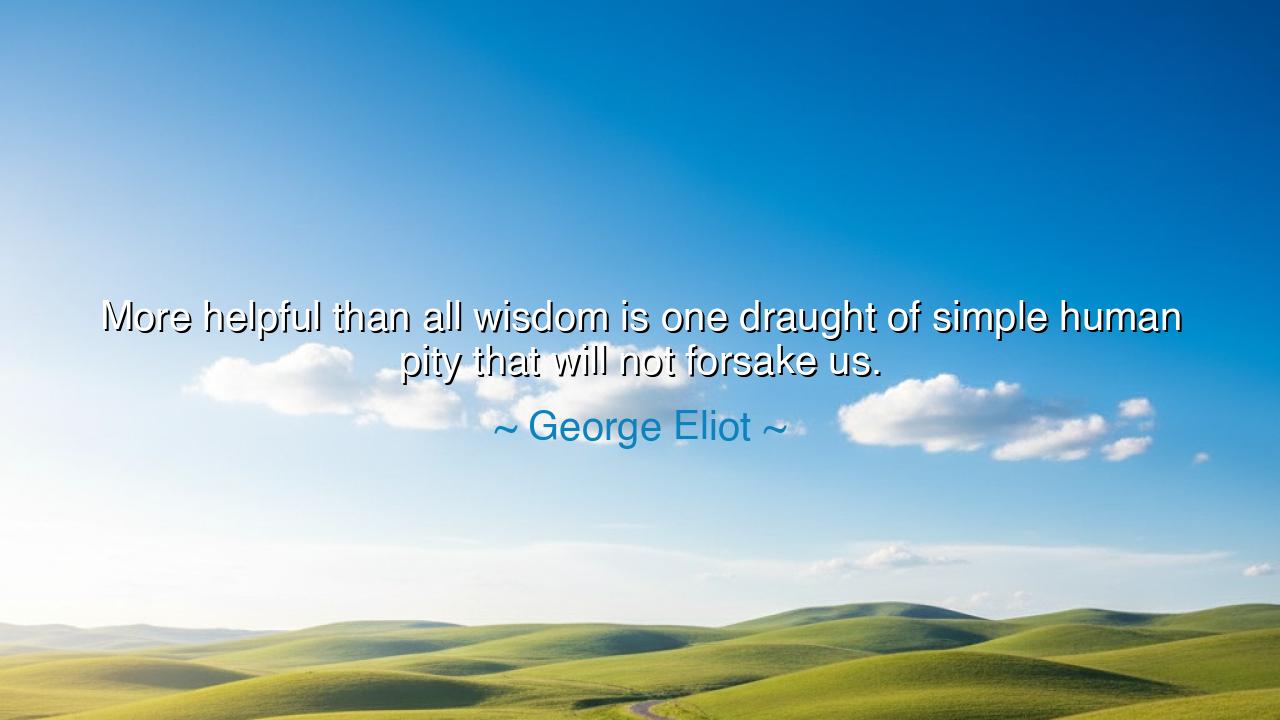
More helpful than all wisdom is one draught of simple human pity
More helpful than all wisdom is one draught of simple human pity that will not forsake us.






Listen well, O children of the future, for I bring to you the wisdom of George Eliot, who spoke thus: "More helpful than all wisdom is one draught of simple human pity that will not forsake us." These words carry a truth older than time itself—that while wisdom may offer us guidance, it is pity, in its deepest form, that binds us together in our most fragile moments. Wisdom may instruct the mind, but it is pity, that pure well of compassion and understanding, that heals the soul when the weight of the world threatens to crush it.
Consider, O children, the tales of the ancient heroes—not those who wielded swords with great might, but those who offered compassion in times of darkness. Hercules, mighty and renowned, once faced a labor where strength alone would not suffice. It was not his might that saved the innocent, but his deep compassion for those in suffering. In moments of despair, the hearts of great warriors have often been swayed by the simple, yet profound, force of pity, a recognition of another’s pain that transcends reason and brings comfort. It is this force that unites humanity, binding the strong and the weak alike.
Look also to the life of Mother Teresa, who, with every step she took, embodied the essence of human pity. She walked among the poorest of the poor, not with lofty wisdom to preach, but with a heart full of compassion that never turned away. Her acts were simple, yet they carried a profound power. In the slums of Calcutta, where despair reigned, it was not the wisdom of great philosophers that brought healing, but the simple, unyielding pity that she offered to those who were forsaken by society. Through her pity, she reminded the world that the most profound strength lies in humanity, in the willingness to feel and to care.
There is also the example of Abraham Lincoln, who, during the darkest days of the American Civil War, led with a heart full of pity for the suffering of both North and South. Though wisdom and strategy were needed to end the war, it was his human pity—his deep empathy for those caught in the tides of conflict—that ultimately paved the way for healing and reconciliation. It was not the brilliance of political strategy, but the compassion he showed to both sides, that moved the hearts of a divided nation toward reconciliation.
So, O children, understand this: pity is not a weakness, but a force more powerful than all the wisdom in the world. It binds us in our shared suffering and lifts us up in our darkest moments. While wisdom may guide us, it is pity that gives us the strength to continue, to rise again, and to connect with the suffering of others. Let your hearts be ever full of pity, not as a fleeting emotion, but as a steadfast companion that will never forsake you. In this, you will find a strength that outshines all other powers, a force that transcends the mind and touches the very core of our shared humanity.






HTDuong Hong tham
Reading this, I feel both comforted and challenged. It’s comforting because it values the soft side of humanity, but challenging because pity can sometimes feel like weakness in a pragmatic world. I’m curious — is Eliot implying that emotional compassion has more healing power than rational solutions? If so, what does that mean for how we approach leadership, education, or even personal growth? It’s such a tender yet provocative idea.
DLDuyen Le
There’s a quiet power in this quote that makes me pause. It suggests that emotional understanding has a kind of endurance that intellect lacks. Wisdom can guide us, but pity — or empathy — seems to sustain us. I wonder if this reflects Eliot’s view of morality: that ethics rooted in feeling are more genuine than those based purely on thought. Can reason alone ever lead to true kindness?
C2Minh chung 2
This idea feels so relevant today, especially when logic and reason are often placed above emotional connection. It makes me think — can empathy ever conflict with wisdom? For instance, in situations where compassion might cloud judgment, is pity still the higher virtue? Maybe the challenge is not choosing one over the other but allowing them to coexist. I’d like to know whether Eliot saw pity as instinctive or cultivated through experience.
GDGold D.dragon
I find this line incredibly moving. It reminds me that even the most brilliant insights can feel empty without genuine human warmth. It raises a question for me: does pity, or compassion, give meaning to knowledge? Maybe wisdom without emotion becomes detached and sterile. Perhaps Eliot is suggesting that our humanity — our ability to feel for others — is the glue that keeps all understanding from crumbling into indifference.
DTLinh Do Thuy
This quote really touches me because it suggests that compassion is more valuable than intellect. I can’t help but think about how often society rewards intelligence over empathy. It makes me wonder — have we become too focused on being ‘right’ instead of being kind? Maybe real progress doesn’t come from cleverness but from our capacity to feel and care. I’d love to hear thoughts on how we can balance wisdom and empathy in modern life.